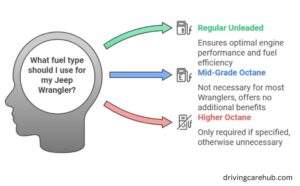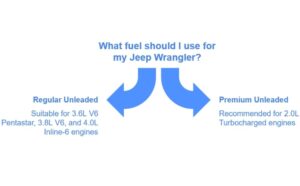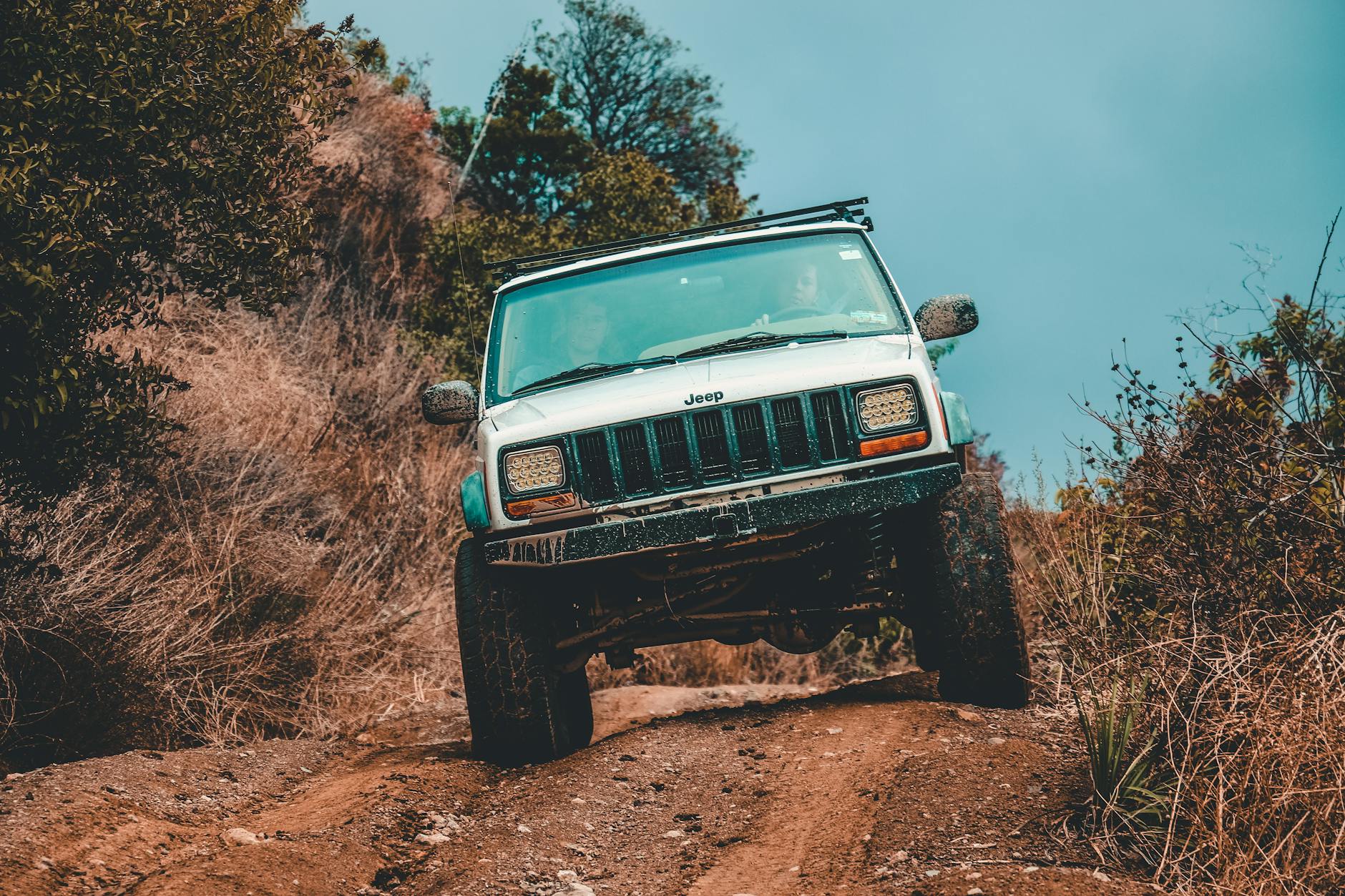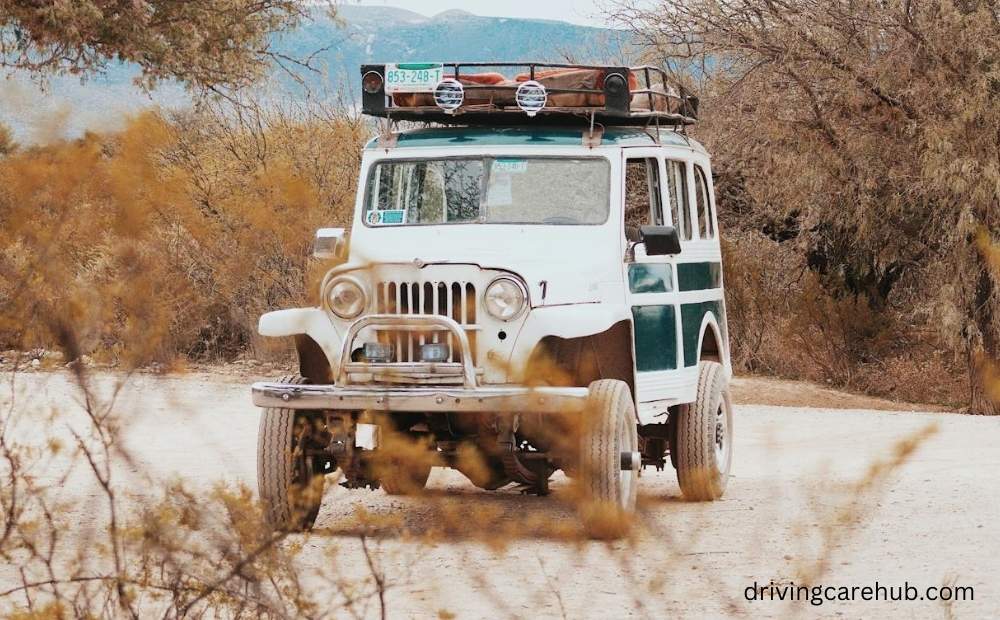The Jeep Wrangler’s engine usually requires simple gasoline, regular unleaded with an octane rating of 87 or higher. Certain latest models may require premium fuel for better performance, although unleaded is recommended for most of this brand’s models.
Picture this: You’re behind the wheel of your rugged Jeep Wrangler, ready for an epic adventure. But as you pull into the gas station, a nagging question pops into your mind – “What kind of gas should I put in this beast?”
Don’t worry, fellow Jeep enthusiast! You’re not alone in this fuel-related confusion. With various options available at the pump and conflicting advice from well-meaning friends, it’s easy to feel overwhelmed. But fear not! We’re about to embark on a journey through the world of Jeep Wrangler fuel requirements, exploring everything from the recommended gas type to alternative fuel options and even tips for maximizing your fuel efficiency. So buckle up and get ready to become a Jeep fueling expert in no time!
Understanding Jeep Wrangler’s Fuel Requirements

Understanding Jeep Wrangler’s Fuel Requirements
When it comes to keeping your Jeep Wrangler running smoothly, understanding its fuel requirements is crucial. Let’s dive into the specifics of what kind of gas your Jeep Wrangler needs and why it matters.
Recommended Fuel Type for Optimal Performance
For most Jeep Wrangler models, the recommended fuel type is regular unleaded gasoline. This is the standard fuel you’ll find at any gas station, making it convenient and accessible for Wrangler owners. Using the correct fuel type ensures:
- Optimal engine performance
- Better fuel efficiency
- Longevity of engine components
Here’s a quick reference table for Jeep Wrangler fuel recommendations:
| Jeep Wrangler Model Year | Recommended Fuel Type |
|---|---|
| 2007 – Present | Regular Unleaded |
| Pre-2007 | Check the owner’s manual |
Octane Rating Explained
The octane rating of gasoline is a measure of its ability to resist “knocking” or “pinging” during combustion. For Jeep Wranglers, the recommended octane rating is typically 87. Here’s what you need to know about octane ratings:
- Lower octane (85-87): Regular gas
- Mid-grade octane (88-90): Not necessary for most Wranglers
- Higher octane (91-94): Premium gas, not required unless specified
Understanding octane ratings helps you make informed decisions at the pump. While some performance vehicles require higher octane fuel, most Jeep Wranglers run perfectly well on regular 87 octane gas.

Potential Consequences of Using Incorrect Fuel
Using the wrong type of fuel in your Jeep Wrangler can lead to various issues:
-
Reduced performance: Incorrect fuel can cause sluggish acceleration and reduced power output.
-
Decreased fuel efficiency: Your Wrangler may consume more fuel than necessary.
-
Engine damage: In extreme cases, using the wrong fuel can lead to engine knocking or even serious damage.
-
Increased emissions: Improper fuel can result in higher emissions, potentially failing emission tests.
To avoid these issues, always refer to your owner’s manual for the correct fuel specifications. If you accidentally use the wrong fuel, it’s best to have the tank drained before driving the vehicle.
Now that we understand the fuel requirements for Jeep Wranglers, let’s explore the primary choice of fuel in more detail.
Regular Unleaded Gasoline: The Primary Choice

Regular Unleaded Gasoline: The Primary Choice
Now that we understand the basic fuel requirements for a Jeep Wrangler let’s explore the primary choice for most Wrangler owners: regular unleaded gasoline. Jeep manufacturers widely recommend this fuel type, which is also the go-to option for many Wrangler enthusiasts.
Benefits of using regular unleaded
Regular unleaded gasoline offers several advantages for Jeep Wrangler owners:
-
Widespread availability
-
Cost-effective
-
Designed for most modern engines
-
Optimal performance for standard Wrangler models
Using regular unleaded gasoline in your Jeep Wrangler ensures that you’re providing your vehicle with the fuel it was designed to use, maintaining its performance and efficiency.
Compatibility with different Wrangler models
Regular unleaded gasoline is compatible with most Jeep Wrangler models, regardless of the year or generation. Here’s a quick breakdown of compatibility:
| Wrangler Generation | Compatible with Regular Unleaded |
|---|---|
| YJ (1987-1995) | Yes |
| TJ (1997-2006) | Yes |
| JK (2007-2018) | Yes |
| JL (2018-present) | Yes |
It’s important to note that while all these models can run on regular unleaded, some high-performance variants or modified engines might benefit from higher octane fuels. Always consult your owner’s manual for specific recommendations.
Impact on engine longevity
Using regular unleaded gasoline in your Jeep Wrangler can positively impact engine longevity in several ways:
-
Prevents knocking and pinging
-
Reduces carbon deposits
-
Maintains proper combustion timing
-
Supports optimal engine temperature
By consistently using the recommended fuel type, you’re ensuring that your Wrangler’s engine operates as intended, potentially extending its lifespan and reducing the risk of premature wear and tear.
Cost-effectiveness of regular unleaded
One of the most significant advantages of using regular unleaded gasoline in your Jeep Wrangler is its cost-effectiveness. Here’s why:
-
Lower price per gallon compared to premium fuels
-
No performance penalty for most standard Wrangler models
-
Widely available, reducing the need for special trips to specific gas stations
-
Consistent pricing across different regions
When you consider the frequent fill-ups required for a vehicle like the Jeep Wrangler, especially if you’re an avid off-roader or frequently embark on long trips, the savings from using regular unleaded can add up significantly over time.
In conclusion, regular unleaded gasoline is the primary choice for most Jeep Wrangler owners due to its compatibility, benefits for engine longevity, and cost-effectiveness. However, it’s essential to remember that fuel requirements can vary based on specific models and modifications. Next, we’ll explore some alternative fuel options for those looking to deviate from the standard choice.
Alternative Fuel Options for Jeep Wranglers

Alternative Fuel Options for Jeep Wranglers
Now that we’ve covered the primary fuel choice for Jeep Wranglers let’s explore some alternative options that owners might consider. While regular unleaded gasoline is the standard, there are situations where other fuel types might be beneficial or necessary.
Premium Gasoline: When and Why to Consider
Premium gasoline, with its higher octane rating, can be a viable option for Jeep Wrangler owners in certain circumstances. Here’s when you might want to consider using premium gas:
-
High-performance modifications: If you’ve made significant engine upgrades to boost performance, premium gas can help prevent knocking and ensure optimal operation.
-
Extreme driving conditions: Premium gas can provide better engine protection and performance when towing heavy loads or driving in high-altitude areas.
-
Manufacturer recommendations: Some newer Wrangler models may recommend premium gas for optimal performance, especially in turbocharged engines.
| Octane Rating | Fuel Type | Best For |
|---|---|---|
| 87 | Regular | Standard daily driving |
| 89-90 | Mid-grade | Slight performance boost |
| 91-94 | Premium | High-performance or extreme conditions |
Ethanol-Blended Fuels: Pros and Cons
Ethanol-blended fuels, particularly E15 and E85, are becoming more common at gas stations. Here’s what Jeep Wrangler owners should know:
Pros:
-
Lower emissions
-
Potentially lower cost per gallon
-
Renewable energy source
Cons:
-
Lower fuel efficiency (less energy per gallon)
-
Not suitable for all Wrangler models
-
Potential for increased engine wear in non-flex-fuel vehicles
It’s crucial to check your Wrangler’s owner manual before using ethanol-blended fuels, as not all models are designed to handle high ethanol content.
Diesel Options for Specific Wrangler Models
While most Jeep Wranglers run on gasoline, there are diesel options available for certain models:
-
Jeep Wrangler EcoDiesel: Introduced in 2020, this model offers improved fuel efficiency and torque.
-
Aftermarket conversions: Some enthusiasts opt for diesel engine conversions for increased power and efficiency.
Benefits of diesel in Wranglers include:
-
Higher torque for off-road performance
-
Better fuel economy, especially for long-distance driving
-
Durability and longevity of diesel engines
However, diesel Wranglers are less common and may have higher maintenance costs. Additionally, diesel fuel availability can be limited in some areas.
When considering alternative fuel options for your Jeep Wrangler, it’s essential to weigh the pros and cons carefully. Factors such as your driving habits, local fuel availability, and your vehicle’s specific requirements should all play a role in your decision. In the next section, we’ll delve into the various factors that can affect your fuel choice, helping you make the best decision for your Jeep Wrangler.
Factors Affecting Fuel Choice

Now that we’ve explored the primary and alternative fuel options for Jeep Wranglers let’s explore the factors that influence fuel choice. Understanding these elements will help you make informed decisions about the best gas for your Jeep Wrangler.
A. Engine Type and Year of Manufacture
The engine type and year of manufacture play a crucial role in determining the appropriate fuel for your Jeep Wrangler. Here’s a breakdown of how these factors impact fuel choice:
| Engine Type | Year Range | Recommended Fuel |
|---|---|---|
| 3.6L V6 Pentastar | 2012-present | Regular unleaded (87 octane) |
| 2.0L Turbocharged | 2018-present | Premium unleaded (91 octane) |
| 3.8L V6 | 2007-2011 | Regular unleaded (87 octane) |
| 4.0L Inline-6 | 1991-2006 | Regular unleaded (87 octane) |
Always consult your owner’s manual for the most accurate fuel recommendations specific to your Jeep Wrangler model.
B. Driving Conditions and Terrain
Your typical driving conditions and terrain can influence your fuel choice:
-
City driving: Regular unleaded is usually sufficient for stop-and-go traffic.
-
Highway driving: May benefit from higher octane fuel for sustained high-speed performance.
-
Off-roading: Consider premium fuel for better engine response in challenging terrains.
-
Towing: Higher octane fuel might be beneficial when towing heavy loads.
C. Climate Considerations
Climate plays a role in fuel selection for your Jeep Wrangler:
-
Hot climates: Higher octane fuel may help prevent engine knocking in extreme heat.
-
Cold climates: Regular unleaded is typically sufficient, but ensure it’s winter-grade in freezing temperatures.
-
High altitude: Lower octane fuel is often recommended due to decreased air pressure.
D. Performance Modifications and Their Impact
If you’ve modified your Jeep Wrangler for enhanced performance, your fuel choice may need to adapt:
-
Engine tuning: Often requires higher octane fuel to prevent knocking.
-
Superchargers or turbochargers: Usually demand premium fuel for optimal performance.
-
Increased compression ratio: Necessitates higher octane to avoid pre-ignition.
-
Exhaust system upgrades: May benefit from premium fuel to maximize power gains.
Remember, while performance modifications can enhance your Jeep Wrangler’s capabilities, they often come at the cost of increased fuel consumption and more stringent fuel requirements.
By considering these factors – engine type, driving conditions, climate, and modifications – you can make an informed decision about the best fuel for your Jeep Wrangler. This ensures optimal performance, efficiency, and longevity for your vehicle. Next, we’ll explore some practical tips for optimizing fuel efficiency in your Jeep Wrangler, regardless of the fuel type you choose.
Optimizing Fuel Efficiency in Your Jeep Wrangler

Optimizing Fuel Efficiency in Your Jeep Wrangler
Now that we’ve explored the fuel options for your Jeep Wrangler, let’s focus on maximising its fuel efficiency. You can significantly improve your Jeep Wrangler’s gas mileage by implementing proper maintenance techniques, adopting fuel-efficient driving habits, and considering certain aftermarket modifications.
Proper Maintenance Techniques
Regular maintenance is crucial for optimizing your Jeep Wrangler’s fuel efficiency. Here are some key maintenance practices to follow:
-
Regular oil changes: Use the recommended oil grade and change it as per the manufacturer’s schedule.
-
Air filter replacement: A clean air filter ensures proper air flow and combustion efficiency.
-
Tire pressure maintenance: Properly inflated tires reduce rolling resistance and improve fuel economy.
-
Spark plug replacement: New spark plugs promote efficient combustion and better fuel usage.
-
Fuel system cleaning: Periodic fuel system cleaning prevents buildup that can affect efficiency.
| Maintenance Task | Frequency | Impact on Fuel Efficiency |
|---|---|---|
| Oil Change | Every 3,000-5,000 miles | Up to 2% improvement |
| Air Filter Replacement | Every 15,000-30,000 miles | Up to 10% improvement |
| Tire Pressure Check | Monthly | Up to 3% improvement |
| Spark Plug Replacement | Every 30,000-100,000 miles | Up to 4% improvement |
| Fuel System Cleaning | Every 30,000 miles | Up to 3% improvement |
Driving Habits for Better Mileage
Your driving style can significantly impact your Jeep Wrangler’s fuel efficiency. Consider adopting these fuel-efficient driving habits:
-
Smooth acceleration and braking: Avoid sudden starts and stops to conserve fuel.
-
Maintain steady speeds: Use cruise control on highways when possible.
-
Reduce idling time: Turn off the engine when parked or waiting for extended periods.
-
Plan your trips: Combine errands to reduce overall driving distance.
-
Remove excess weight: Clear out unnecessary items from your Jeep to reduce weight.
Aftermarket Modifications for Improved Fuel Economy
While the Jeep Wrangler is designed for off-road capabilities, certain aftermarket modifications can help improve its fuel efficiency:
-
Low-resistance tires: Switch to low-rolling-resistance tires for better fuel economy on paved roads.
-
Aerodynamic improvements: Add wind deflectors or a tonneau cover to reduce drag.
-
Engine tuning: Consider a performance chip or ECU remapping for optimized fuel injection.
-
Lightweight wheels: Upgrade to lighter alloy wheels to reduce overall vehicle weight.
-
Cold air intake: Install a cold air intake system for improved air flow and combustion efficiency.
It’s important to note that while these modifications can improve fuel efficiency, they may affect your Jeep Wrangler’s off-road performance. Always consider your primary usage before making significant changes.
By implementing these maintenance techniques, adopting fuel-efficient driving habits, and considering appropriate aftermarket modifications, you can significantly improve your Jeep Wrangler’s fuel efficiency. Remember, consistency is key when it comes to maximizing your vehicle’s gas mileage. In the next section, we’ll address some frequently asked questions about Jeep Wrangler fuel consumption and efficiency.
FAQs
To address common concerns about Jeep Wrangler fuel requirements, here are the top six frequently asked questions:
-
What octane rating should I use in my Jeep Wrangler?
-
Most Jeep Wranglers require 87 octane (regular unleaded) gasoline
-
Some high-performance models may recommend 91 octane (premium)
-
-
Can I use E85 fuel in my Jeep Wrangler?
-
Only compatible with Flex Fuel models
-
Standard Jeep Wranglers are not designed for E85 use
-
-
How often should I fill up my Jeep Wrangler?
-
Depends on tank size and driving habits
-
Average range: 300-400 miles per tank
-
-
Does using premium gas improve performance?
-
Generally not necessary unless specified by manufacturer
-
May provide minimal benefits in some high-performance models
-
-
Can I use diesel fuel in my Jeep Wrangler?
-
Only in diesel-engine Wranglers (rare in North America)
-
Never use diesel in gasoline engines
-
-
How can I improve my Jeep Wrangler’s fuel efficiency?
-
Maintain proper tire pressure
-
Use recommended motor oil
-
Remove unnecessary weight
-
Drive conservatively
-
| Fuel Type | Compatibility | Benefits |
|---|---|---|
| Regular Unleaded (87 octane) | Most models | Cost-effective, meets standard requirements |
| Premium (91+ octane) | Some high-performance models | Potential performance boost, engine protection |
| E85 | Flex Fuel models only | Renewable option, potential cost savings |
| Diesel | Diesel engine models | Higher torque, better fuel economy |
Understanding these fuel-related questions can help Jeep Wrangler owners make informed decisions about their vehicle’s fuel requirements and optimize performance.
Jeep Wranglers are versatile vehicles that primarily run on regular unleaded gasoline. While this is the most common and recommended fuel type, some models may be compatible with alternative options like E85 or diesel. Understanding your specific Wrangler’s fuel requirements is crucial for optimal performance and longevity.
When it comes to fueling your Jeep Wrangler, always consult your owner’s manual for the most accurate information. By choosing the right fuel and implementing fuel-efficient driving habits, you can maximize your Wrangler’s performance while minimizing your environmental impact and fuel costs. Remember, proper maintenance and responsible driving go hand in hand with fuel choice to keep your Jeep running smoothly for years to come.

Jack Thompson is a writer and seasoned auto mechanic with over 15 years of experience in the automotive industry. Known for his expertise in vehicle mechanics, Jack has a deep understanding of car and truck systems. His skills, honed through years of hands-on experience, have made him a trusted name in the field. Jack is committed to providing valuable insights into car maintenance and repair, helping vehicle owners keep their vehicles in top condition.

